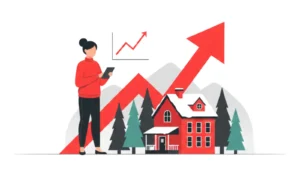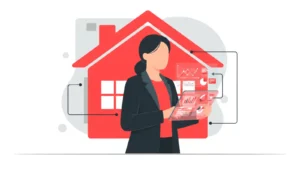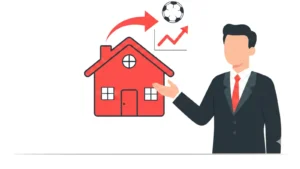Table of Contents
Updated : May 7, 2025
In the fast-paced world of short-term rentals, managing properties can often feel like juggling flaming torches—challenging, intense, and fraught with the risk of burnout. But what if there was a way to streamline your operations and make property management feel less like a circus act? Whether you’re a seasoned pro or just dipping your toes into the short-term rental market, this blog covers short-term rental property management tips that will equip you with seven practical strategies to simplify your management process and maximize your success.
What Is the Difference Between Short-Term Rental Management and Long-Term Rental Management?
Before diving into managing short-term rentals effectively, let’s first understand the difference between short-term and long-term rentals. You might want to do both as a property manager to diversify your proper management portfolio. While both strategies can generate income, they involve different processes, guest types, and operational demands.
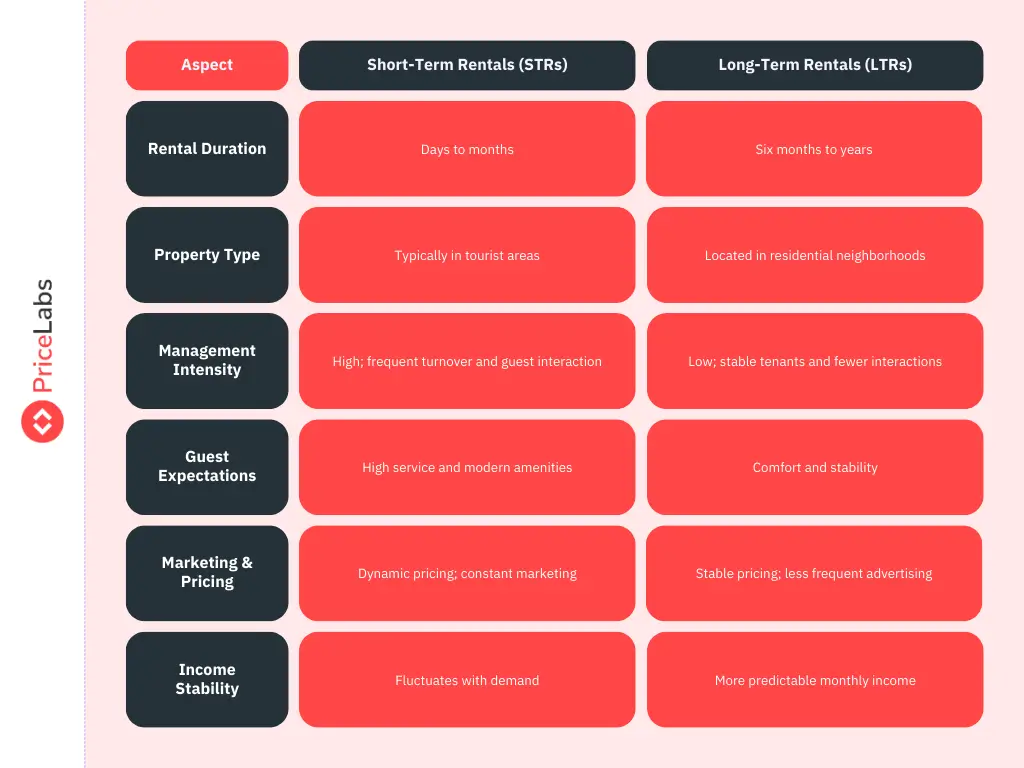
1. Rental Duration
The primary distinction lies in how long the property is rented.
- Short-Term Rentals (STRs): These rentals are typically leased for just a few days to a few months. They cater to vacationers, business travelers, and other temporary guests, which means you’ll see a high turnover of occupants.
- Long-Term Rentals (LTRs): In contrast, long-term rentals are leased for six months or longer. This approach provides a steadier income stream, as tenants commit to living in the property for an extended period.
2. Property Type and Location
The type and location of the properties can also differ significantly.
- Short-Term Rental Properties: STRs are usually found in tourist hotspots like city centers or nearby popular attractions. They often come equipped with modern amenities and furnishings to meet the needs of short-term guests.
- Long-Term Rental Properties: Long-term rentals can be located in residential areas, often appealing to families or professionals looking for stable housing. These properties prioritize comfort and practicality over luxury.
3. Management Intensity
The demands of managing these properties vary considerably.
- Short-Term Rental Management: Managing STRs is generally more labor-intensive. Property managers must handle guest communications, vacation rental marketing, and rapid turnovers, including cleaning and restocking the property after each stay. This requires a high level of organization and responsiveness.
- Long-Term Rental Management: In contrast, managing LTRs requires much less daily involvement. Once tenants are settled in, the focus shifts to rent collection and responding to maintenance requests, leading to a more predictable workload.
4. Guest Expectations and Property Standards
Guest expectations differ between these rental types, impacting how you maintain and market the properties.
- Short-Term Guests: STR guests expect a high level of service and modern amenities. Cleanliness and a well-furnished environment are a must. They affect the reviews guests leave for your rental, and positive reviews can significantly influence future bookings.
- Long-Term Tenants: LTR tenants prioritize comfort and stability. While they expect timely maintenance and a well-kept living space, they focus more on creating a home than providing luxury experiences.
5. Marketing and Pricing Strategies
Marketing approaches and pricing structures differ significantly between short-term and long-term rentals.
- Short-Term Rental Pricing: STR pricing is often dynamic, changing based on demand, local events, and seasonality. Effective marketing strategies are vital for maintaining high occupancy rates, which may require consistent advertising across multiple platforms.
- Long-Term Rental Pricing: LTR prices are more stable and set based on market conditions. Once occupied, these properties are typically taken off rental platforms, reducing the need for ongoing marketing.

6. Income Stability and Fluctuations
The income potential and stability vary between the two types of rentals.
- Short-Term Rental Income: STRs can yield higher income due to premium nightly rates, but this income is often less predictable. Vacation rental seasonality and competition can lead to fluctuating occupancy rates, making effective pricing strategies essential.
- Long-Term Rental Income: LTRs generally provide a steadier income stream, with monthly rent payments that make financial planning easier. The longer lease terms offer more certainty in cash flow.
Ultimately, choosing short-term and long-term rental management depends on your goals, market conditions, and personal preferences. By understanding these differences, you can make an informed decision that aligns with your operational capabilities and financial objectives. Whether you choose the dynamic environment of short-term rentals or the stability of long-term leasing, each path offers unique opportunities and challenges.
What Aspects of Short-term Rental Management Does a Property Manager Deal With?
Short-term rental property managers handle various tasks to ensure optimal property performance and guest satisfaction. Their responsibilities extend beyond traditional property management due to the dynamic nature of short-term rentals. Here’s a professional overview of the key aspects:
1. Guest Management
Short-term rental managers focus on delivering exceptional guest experiences, which includes:
- Communication: Promptly responding to guest inquiries before, during, and after their stay.
- Check-in and Check-out Coordination: Ensuring a seamless process, often utilizing smart locks or concierge services.
- Review Management: Encouraging positive reviews and addressing negative feedback constructively.
2. Dynamic Pricing and Revenue Management
Unlike traditional rentals, short-term rental pricing fluctuates based on demand, seasonality, and local events. Managers:
- Utilize tools like PriceLabs to set competitive, dynamic pricing.
- Monitor market trends and occupancy rates to optimize revenue.
- Create and implement discounts or promotions during slow periods.
Upgrade Your Short-term rental Revenue Management
Every property manager needs a revenue management software like PriceLabs to help them make data-backed pricing deicions and save time.
Try For Free3. Property Maintenance and Housekeeping
Maintaining a property in pristine condition is essential for guest satisfaction. Managers:
- Coordinate routine and deep cleaning between guest stays.
- Ensure timely repairs and preventive maintenance.
- Stock essential supplies and amenities consistently.
4. Marketing and Listing Optimization
Visibility and appeal are critical in attracting bookings. Managers:
- Craft compelling, professional listings with high-quality photos and descriptions.
- Optimize listings for platforms like Airbnb, Vrbo, and Booking.com.
- Manage promotions, discounts, and seasonal campaigns to maximize occupancy.
5. Compliance and Legal Management
Navigating local regulations is a crucial responsibility. Managers ensure:
- Compliance with short-term rental licensing and zoning laws.
- Payment and reporting of applicable taxes (e.g., transient occupancy tax).
- Adherence to insurance and safety standards.
6. Owner Relations and Reporting
Effective communication with property owners builds trust and aligns goals. This includes:
- Providing regular performance updates, such as occupancy and revenue reports.
- Offering insights and recommendations to maximize profitability.
- Addressing owner concerns promptly and professionally.
7. Technology Integration
The fast-paced nature of short-term rentals requires efficient use of technology. Managers often:
- Leverage property management software (PMS) for streamlined operations.
- Use smart home devices to enhance guest convenience and security.
- Automate repetitive tasks like messaging, pricing, and scheduling.
8 Short Term Rental Property Management Tips
If you are planning to manage a short term rental then it requires streamlining of administrative tasks to avoid human-error and smooth running of the short-term rental business. Below are a few tips to follow, to streamline your short-term rental property management.
Stay Updated on Vacation Rental Trends
The vacation rental industry evolves rapidly, making it essential to stay informed about market news, local regulations, and travel trends. For instance, the growing interest in sustainable tourism and authentic local experiences can significantly impact your occupancy rates. By keeping up with these trends, you can adapt your offerings and tap into new growth opportunities. Resources like Smoobu’s blog can help you stay ahead of industry changes.
Automate Your Team’s Workflow
Managing a skilled team is essential for delivering top-notch service in short-term rentals, but effective coordination is key. To ensure smooth operations, streamline team activities like cleaning schedules, especially during peak seasons, and automate administrative tasks.
Tools like Smoobu make this easier by allowing you to create assistant accounts with tailored permissions and automate reservation notifications. You can also schedule reminders, such as check-in or check-out alerts, ensuring every task is handled efficiently and on time.
Master Your Budget
Like any other business, you need to be a pro at budgeting if you want to see profits. Keeping track of various expenses like utilities, cleaning, maintenance, and platform fees is crucial in short-term rental management. Effective budgeting ensures that every dollar spent contributes to your property’s success.
When explaining your expenses to a business partner, even seemingly small purchases—like a $100 lamp—can raise questions. While providing a high-quality guest experience is essential, it’s equally important to balance these costs with your revenue to maintain positive cash flow and profitability.
Choose The Right Platform
One of the most important tasks in short-term rental property management is deciding how you want to be discovered by your guests. While you would wish to use your direct booking website, listing on popular platforms like Airbnb, Vrbo, and Booking.com helps you reach a wider audience quickly. It also allows you to target specific groups of travellers who are an excellent match for your property. For instance, if your property is family-friendly, listing on a platform that caters to families can significantly boost your chances of attracting the right guests.
Using reputable platforms also brings peace of mind for both you and your guests. These sites have built-in trust and security measures that protect personal information and ensure safe transactions. When guests see that you’re using a well-known platform, they’re more likely to feel confident booking with you.
Optimize Your Listings for Searchability
Once you have chosen the platforms you want to list your property on, its time to make them as appealing to your potential guests as possible. Think of your property listing as your online storefront. The more attractive and searchable it is, the more bookings you’ll get. Use high-quality photos that showcase your property’s best features. For instance, if your rental has a stunning ocean view, make sure it’s one of the first images guests see. Incorporate keywords that potential guests might search for, like “cozy cabin in the mountains” or “luxurious downtown apartment.”
You can also use PriceLabs Airbnb Description Generator to simplify this task.
Streamline Your Property Maintenance
Once guests arrive at your vacation rental, they want to feel at home while getting a sense of vacation. A clean and well-maintained property gives your guests that and are essential elements that determine your guest satisfaction. Consider hiring a professional cleaning service to ensure that every corner shines and invest in the latest health and safety detectors and technology. Invest in quality linens and toiletries to elevate the guest experience. For example, adding plush bathrobes or high-end coffee can make guests feel pampered, increasing the likelihood of repeat bookings and positive reviews.
However, it can be hard to maintain a cleaning schedule manually. There are tool-like tools like Breezeway, an official Airbnb Software Partner, which can automate the cleaning process for you by scheduling and tracking cleaning and maintenance tasks.
Provide Enticing Amenities
The success of your short-term rental depends on how much you can provide your guests. When people are vacationing, they want to experience a whiff of luxury. Providing amenities that bring them into vacation mode while also providing them with the comfort of home is the key to unlocking increased bookings and great guest reviews. You first want to ensure that you are providing all the necessary amenities that are expected out of a vacation rental like:
- Furnishing
- Free WiFi
- Toiletries
- Iron
- Air conditioning
- Washing Machine
- Dryer
If your vacation rental provides a good view of the local attraction or the landscape like mountains or the beaches, then do make sure to include them in the list of amenities you offer. You can also use PriceLabs Market Dashboard to see which amenities are popular in your market and make it a point to include those in your rental.

Add Competitive Pricing
This is arguably the most challenging aspect of short-term rental property management. To stay competitive in the market, you want to consistently adapt your pricing strategy according to shifting market trends. Your nightly price determines if a guest will book your property or not. If you price too low, you might give your guests the impression that your property is not high-end. If you charge too high, you will price yourself out of the market. You also need to adjust your revenue management strategy according to shifting seasonality.
To price your property competitively, here are a few variables you can consider:
- Seasonality
- Location
- Events
- Holidays
- Demand
- Day of the week
Analyzing your competitor data helps with this, However, doing this manually can be time consuming and can lead to human errors. To skip the hassle, consider using PriceLabs dynamic pricing tool. This tool will automatically increase or decrease your prices according to market demand. The algorithm analyzes the data received daily from Airbnb, Vrbo and KeyData to analyze shifts in market demand to provide these pricing suggestions and automatically updates it on the OTAs so that you don’t have to.
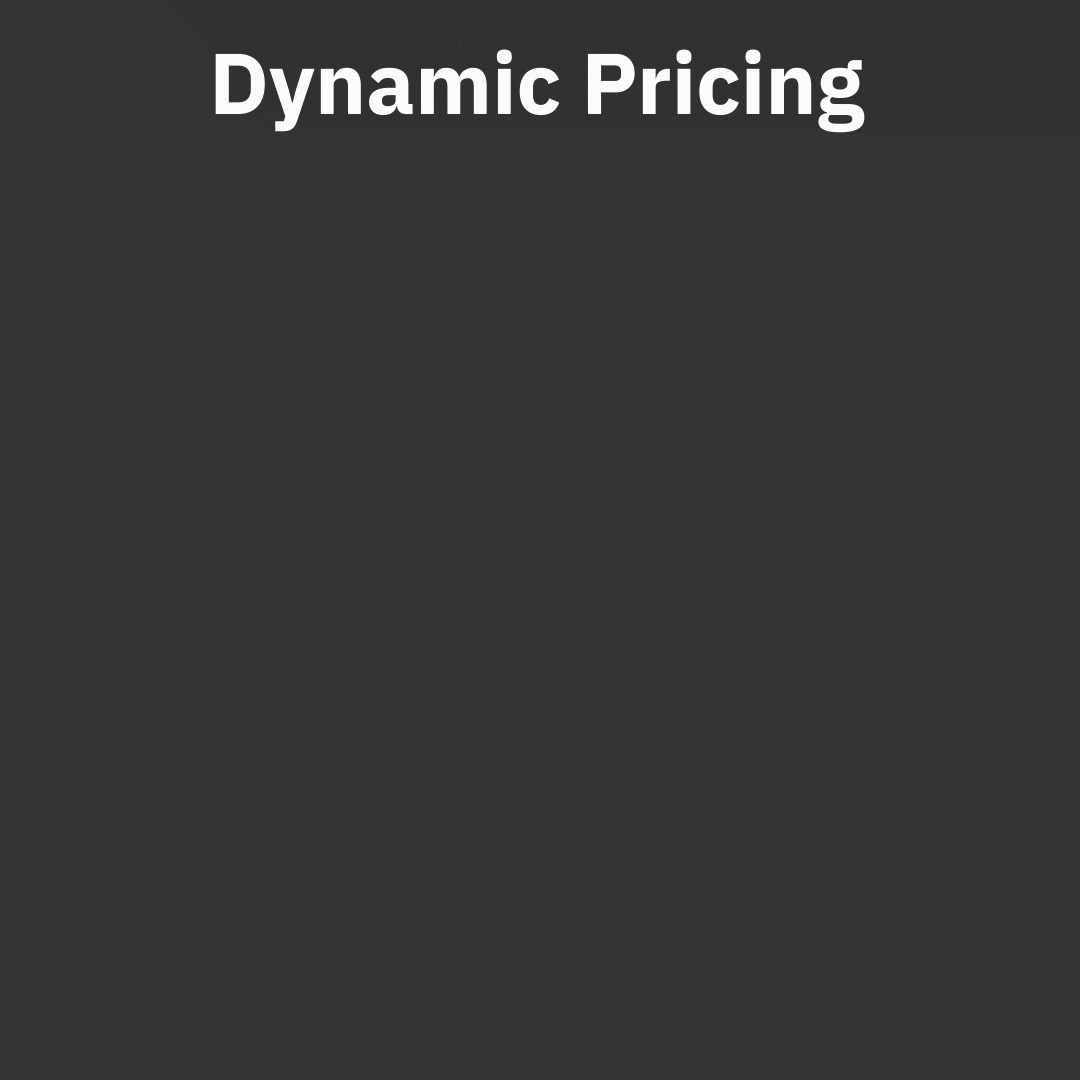
Give Prompt Responses
Short-term rental management does not end with listing your property. You have to consistently communicate with your potential guests to provide them with all the necessary information. After a booking is made and your guests arrive, the communication doesn’t stop, as they may need to contact you about unannounced issues or concerns.
Clear and timely communication can set you apart from the competition. Respond to inquiries quickly, ideally within an hour, to create a positive first impression. Automated messaging tools are used to send guests pre-arrival instructions and check-in details. For instance, a friendly message with local restaurant recommendations can enhance their stay and encourage positive reviews. You can use Property Management Systems to automate guest communication.
Encourage Positive Reviews

Positive reviews are the only way to get more guests through the door. It determines your credibility as a vacation rental property manager. Providing an unforgettable guest experience is the only way to encourage great guest reviews.
However, reminding them to do so is vital since most people don’t proactively leave reviews if not asked. Remember to share reviews, ratings, and other user-generated content on social media to promote your property further.
Adhere to Regulations
Understanding local laws and regulations regarding short-term rentals is vital. Make sure to obtain any necessary licenses and pay applicable taxes. For instance, in some cities, short-term rentals are only permitted in specific zones or may require registration with the local government. Being compliant not only protects your business but also builds trust with your guests.
Conclusion
Managing short-term rentals can be challenging, but you can do it effortlessly with the right strategy and approach discussed in this article. Technology is your best friend when taking care of property management for short-term rentals.
Leverage dynamic pricing tools like PriceLabs to receive more bookings and earn more revenue per guest.


